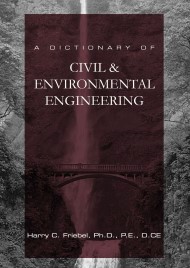A Dictionary of Civil & Environmental Engineering (Print)
Whether you're a Civil, Water Resources (Hydrology & Hydraulics), Construction, Geotechnical, Structural, Transportation, or Environmental Engineer, A Dictionary of Civil & Environmental Engineering will help you prepare and pass the Professional Engineering (PE) exam.
A Dictionary of Civil and Environmental Engineering is the first-ever dictionary written exclusively for all five (5) disciplines of the Civil and Environmental PE examinations. Created by expert Hydraulic Engineer and Water Resources/Environmental Engineering PE review course instructor Dr. Harry C. Friebel, this comprehensive dictionary guides you through the journey of studying for the PE examination - no more wondering or guessing what a particular term means. During the examination, this dictionary will supplement your understanding of the questions being asked (especially those qualitative questions) providing the necessary edge of getting additional problems correct, increasing your chances of passing the examination, and maximizing your potential as a professional engineer.
This book contains terms you need to understand and pass your PE exam. It includes over 20,000 terms, phrases, acronyms, and definitions from the fields of Civil, Water Resources, Construction, Geotechnical, Structural, Transportation, and Environmental Engineering, plus many others. Each comprehensive definition provides reliable, easy-to-understand descriptions.
FAQs
Some states require a BS degree from an ABET-accredited engineering program to sit for the PE exam. Other states allow you to take the PE exam with a degree in engineering technology, physics, math, or chemistry—or without any degree—as long as you’ve met the required work experience. Check your state requirements to see if you can take the PE exam without an engineering degree.
Most states allow you to take the PE exam after passing your FE exam and gaining at least four years of post-college work experience. However, some states now allow examinees to sit for the PE exam before completing their work experience. Check your state requirements to see when you’re qualified to sit for the exam.
The PE exams are not considered easy to pass, but the exam will become easier if the content reflects topics that you're familiar with from your current line of work. Think about your career goals when considering the PE exam. Are you seeking a promotion in your current role? You should select the exam that best supports your current career. Are you trying to switch industries? Choose the exam that will set you up for success in your new field. Rather than seek out the easiest PE exam, select the one that will support your goals.
